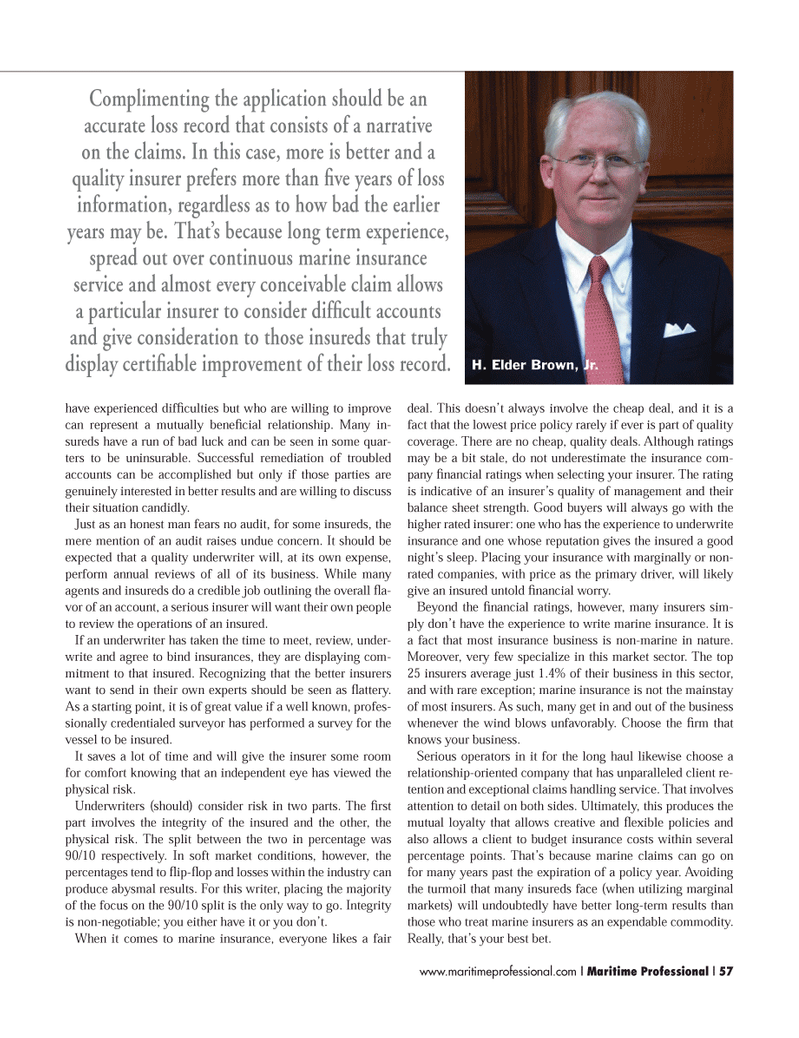
Page 57: of Maritime Logistics Professional Magazine (Q1 2013)
Maritime Risk
Read this page in Pdf, Flash or Html5 edition of Q1 2013 Maritime Logistics Professional Magazine
have experienced difÞ culties but who are willing to improve can represent a mutually beneÞ cial relationship. Many in- sureds have a run of bad luck and can be seen in some quar- ters to be uninsurable. Successful remediation of troubled accounts can be accomplished but only if those parties are genuinely interested in better results and are willing to discuss their situation candidly. Just as an honest man fears no audit, for some insureds, the mere mention of an audit raises undue concern. It should be expected that a quality underwriter will, at its own expense, perform annual reviews of all of its business. While many agents and insureds do a credible job outlining the overall ß a-vor of an account, a serious insurer will want their own people to review the operations of an insured. If an underwriter has taken the time to meet, review, under- write and agree to bind insurances, they are displaying com- mitment to that insured. Recognizing that the better insurers want to send in their own experts should be seen as ß attery. As a starting point, it is of great value if a well known, profes- sionally credentialed surveyor has performed a survey for the vessel to be insured. It saves a lot of time and will give the insurer some room for comfort knowing that an independent eye has viewed the physical risk. Underwriters (should) consider risk in two parts. The Þ rst part involves the integrity of the insured and the other, the physical risk. The split between the two in percentage was 90/10 respectively. In soft market conditions, however, the percentages tend to ß ip-ß op and losses within the industry can produce abysmal results. For this writer, placing the majority of the focus on the 90/10 split is the only way to go. Integrity is non-negotiable; you either have it or you donÕt. When it comes to marine insurance, everyone likes a fair deal. This doesnÕt always involve the cheap deal, and it is a fact that the lowest price policy rarely if ever is part of quality coverage. There are no cheap, quality deals. Although ratings may be a bit stale, do not underestimate the insurance com-pany Þ nancial ratings when selecting your insurer. The rating is indicative of an insurerÕs quality of management and their balance sheet strength. Good buyers will always go with the higher rated insurer: one who has the experience to underwrite insurance and one whose reputation gives the insured a good nightÕs sleep. Placing your insurance with marginally or non- rated companies, with price as the primary driver, will likely give an insured untold Þ nancial worry. Beyond the Þ nancial ratings, however, many insurers sim- ply donÕt have the experience to write marine insurance. It is a fact that most insurance business is non-marine in nature. Moreover, very few specialize in this market sector. The top 25 insurers average just 1.4% of their business in this sector, and with rare exception; marine insurance is not the mainstay of most insurers. As such, many get in and out of the business whenever the wind blows unfavorably. Choose the Þ rm that knows your business. Serious operators in it for the long haul likewise choose a relationship-oriented company that has unparalleled client re- tention and exceptional claims handling service. That involves attention to detail on both sides. Ultimately, this produces the mutual loyalty that allows creative and ß exible policies and also allows a client to budget insurance costs within several percentage points. ThatÕs because marine claims can go on for many years past the expiration of a policy year. Avoiding the turmoil that many insureds face (when utilizing marginal markets) will undoubtedly have better long-term results than those who treat marine insurers as an expendable commodity. Really, thatÕs your best bet. Complimenting the application should be an accurate loss record that consists of a narrative on the claims. In this case, more is better and a quality insurer prefers more than Þ ve years of loss information, regardless as to how bad the earlier years may be. ThatÕs because long term experience, spread out over continuous marine insurance service and almost every conceivable claim allows a particular insurer to consider difÞ cult accounts and give consideration to those insureds that truly display certiÞ able improvement of their loss record. H. Elder Brown, Jr. www.maritimeprofessional.com | Maritime Professional | 57MP #4 50-63.indd 57MP #4 50-63.indd 572/25/2013 10:32:36 AM2/25/2013 10:32:36 AM

 56
56

 58
58
